Archetypal

I thought I was completely unfamiliar with this story as I had not seen the movie nor did I know anything about the book. However, it turns out that I have indeed seen a smilar movie, Dave! It turns out that story has been used over and over again by various people. I don't know if this version is the original, though it's clearly a spin on the "The Man in the Iron Mask" plot from one of the Three Musqueteers sequels.
I personally prefer Dostoevsky's take on this kind of idea - I would be far more likely to fear a doppleganger and be paranoid, or a the very least confused, than I would see it as an opportunity for High Adventure and Noble Deeds, and so forth. I mean, to me Hope's approach is so indicative of the problem in English literature around the end of the 19th century - better stuff was being written in much of the rest of the "west" on the whole.
But this is well paced and doesn't stop to let you ponder its absurdities. He also coined Ruritania here, and I honestly didn't know this is where that fake European kingdom - and the source of so many fake European kingdoms - came from. That in itself is really coold; being the first person to create such a prominent idea in adventure literature.
So he seems to have invented two things with this novel, and that's something I cannot ignore, even if I don't really care for these types of stories.
Highly influential if nothing else

I was only familiar with this story from the '80s Hollywood version, which I had been told was drastically different from the book. Sure enough, it absolutely was. So much of it is utterly different as to be (nearly) a different story. But anyway...
Putting aside the problems we may find in Victorian literature with how it portrays Africans versus Europeans...
This was apparently the first "Lost World" novel, and for that I guess I need to acknowledge that it's a significant landmark. It's also the only "Lost World" novel I have read (though I have seen plenty of movies!), so I guess everything that seems to me cliche was established with this novel, and that's something that's really rather significant and astounding.
However, sometimes being first isn't necessarily being best. This story was apparently written on a dare to try to write something "half" as good as Treasure Island. Well, Haggard is no Robert Louis Stevenson. And I must say that, though I haven not read Conan Doyle's The Lost World, I have read all the Holmes stories, and I would put money on The Lost World being a superior type of this genre. Haggard's story feels like too much adventure cliche, too much glossing over seemingly important details (to keep it short enough to publish in the era?), and, most importantly, supreme ignorance of South Africa and the people in it. Some of the latter is excusable of the era, but some of it is utterly ridiculous. Here are two examples: chainmail (chainmail!!!) armour and the locals fighting as if they were Roman legionaries (and, bravely led by the white men, but of course). And this is all the more surprising that the man lived in South Africa for seven years prior to writing this. Maybe he didn't get out enough? And it's the details like that that really keep me from enjoying what should be a pioneering work. I just can't get my head around them.
Of historical interest (in terms of the evolution of the adventure novel) but that's about it.
Very meh

I only know Grisham from the old days when his novels were constantly turned into "event movies" (or the closest thing we had to those back in the '90s). I watched many of them, though not every one, and, at least as a teenager, thoroughly enjoyed a couple of them, particularly A Time to Kill and The Pelican Brief.
Light spoilers ahead. You have been warned.
Maybe films make Grisham's novels come alive better or maybe my tastes have changed (they absoltely have) or maybe this is just lesser Grisham, but this is pretty blah. Grisham's prose is admirably economical but for some reason that doesn't help me with this mystery. Rather, I found the plot awfully formulaic, as if Grisham was ticking off various things along the way, to make sure we completely sympathize with Patrick (as the novel is designed to do from the start) and to make sure all the evildoers are punished. This is some stupid noble crime stuff. (Crimes aren't crimes if Justice is served!) Patrick isn't very likable and it's hard to know why he has friends and I really don't know why this elaborate crime to redress another crime is somehow okay. Also, I have no idea why Patrick is so damn rich to begin with.
It must be nice to a rich lawyer who can ripoff his partners for the greater good and move to Brazil for a few years with no need to work. Kind of thought he deserved those electric shocks just a little...(That's a joke!)
Good

I am not a Yankees fan or a Sox fan but I am a fan of The Breaks of the Game, probably the best book I have ever read about sports. This book is not on that level, but, for someone like me who was not alive during the summer of 1949, and who was unaware of what happened, Halberstam still manages to capture enough of interest for someone like me, who hates both teams, to make this engaging, interesting and even compelling by the end. There's a host of interesting back-stories and some of the the most interesting information is how things have changed (for the better!): apparently players didn't drink water during the games because they thought it would make them "bloated" and players weren't allowed to have snacks during the games because they would no longer be viewed like men. So that's crazy.
Anyway, the drama of the pennant race is what really turns this book from a rather so-so account of seemingly just another baseball season into a kind of incredible story of two teams (of fairly unknown baseball players - at least to me - when you omit the Dimaggios and Williams) imperfectly striving to be the best.
Worth your time, even if you don't like baseball.
A Classic

I first read this as a tween and I honestly didn't remember much of it at all.
Though I kind of have a love/hate relationship with Dickens, it's pretty tough to say anything bad about this story. It's so unbelievably canonical I have trouble putting it into words. List off a mystery / horror cliche and it probably originated with this story. I exaggerate, but the arc of so many mysteries and horror tales follow a very similar pattern. Dickens may have not been the first to use so many of these tropes, but he was likely the first to achieve so much success with them, and to put them in a package so accessible. And at the same time, he includes his usual social comment. It's when he's brief like this, and when he still thinks about suspense, that I can appreciate it him. A true classic.
Funny
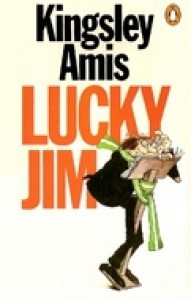
This is a laugh-out-loud novel about what it's like to feel like a fraud teaching at a university (something I can sort of relate to) while you hate your (sort of girlfriend), hate your boss, hate your subject matter and generally hate your life - and that hate manifests itself in you screwing everything up. There are a whole bunch of passages that made me laugh out loud and or at least chuckle, especially the ridiculous climax. Someone's made a movie out of it and I want to see it (though I'm a little worried that, because it was made in the '50s, it will be far tamer than the book).
The one thing I can say against it is that the book has dated somewhat, in that universities aren't exactly like this any more (at least I suppose they aren't in England, they sure aren't in Canada) and also Jim's kind of coiled, inarticulate displeasure is rather too English, and too old-school English at that, to really, really connect with someone in the 21st century. But despite that, I still laughed a lot, though I think Jim would have been more likeable to me, had I been born 50 years earlier.
A necessary critique utterly ruined by conspiratorial nonsense

I have finished nearly every book I have ever started but I will not be finishing this one. I apologize for the slipshod nature of what follows. This has been a trying experience for me.
I totally believe him, that a conspiracy existed to create a cabal / oligopoly. I think he has met that burden of proof rather easily, but…
He seems to not fully understand what money is, i.e. his fundamental understanding of (really) basic economic theory seems off (compared to his understanding of practical economics, which is great). He picks an arbitrary point for the value of the dollar and claims the Fed has devalued it. But that’s only relative, as the dollar, like all money, is a fiction. It’s socially created; it’s relative. So you’re not necessarily saying anything unless you can demonstrate that the Fed has been the primary causal force in the worst devaluing of the dollar since the dollar has existed, and of course he cannot say that.
Also, he keeps saying the Fed invents money out of nothing. What does he think money is exactly? It’s invented out of nothing. So what exactly is he complaining about?
These books that blame everything on a particular institution always make the same assumption: that not only would life be the same without it, it’d be better. But I don’t know of a developed country without a central bank (that could be ignorance on my part). And though there are certainly better ways of setting up a central bank than how the Fed was set up (and that is something we could go into if you want to talk about it), the idea of a central bank in theory seems pretty central to modern economies. He can make no real claim that we’d be living in this kind of world without usury and excessive lending, as that’s how our economies, for better and worse, have been functioning. Yes, the Fed should be reformed. But don’t pretend that broad investment and rapid economic development can occur without insane lending practices.
His first example in Chapter 3, about the fraud with the railroad, is really alarming - people should have gone to jail. But the other examples he doesn’t present arguments for. His argument is this: I am opposed to bailouts personally, therefore bailouts are bad; I accept no other arguments than the economic one. And that’s not convincing to anyone. I generally deplore corporate welfare (depending on the situation), but if I had written a book where one central tenet was that corporate welfare was bad, I would at least try to tell you why, beyond “everyone should pay their debts”. That’s an argument? It sounds like a tenet of a religion.
He claims that if we all suffer the consequences of bad debts we will learn from our actions and avoid them in the future. He seems to think if we had a completely free market, we would learn from our lessons. It’s like he’s never studied history in his life. The history of humanity is a history of repeat mistakes. He seems to believe that government regulation - i.e. the laws that would prevent these banks from even being in these ridiculous positions, such as we have in Canada - is inherently bad, and yet he wants people to live up to an impossible standard.
The statement where we can all stop taking him seriously occurs on page 62 of my copy: “Voters and politicians were silent on the issue, apparently awed by the sheer size of the numbers and the specter of economic chaos. Decades of public education had left their mark.”
From this point on, I stuck with the chapter summaries for the rest of the part. In another chapter summary he blames the Savings and Loan crisis on the New Deal. I am over simplifying slightly, but seriously. If it weren’t for socialism we wouldn’t have all these people trying to rob others of their savings?!?! Has the man not watched Glengarry Glen Ross?
He talks about the four different types of money and how paper money isn't "real" and though I understand where he is coming from, I have to object. He claims Gold has intrinsic value whereas paper does not. But I don't know what the intrinsic value is of gold is; it's just historically treated that way, you know? You can't really do anything with it. At least oil is clearly productive. But I also worry that countries stuck on the gold standard might not have had the same explosion of technology and wealth that we've had in the last 80-90 years (or what have you). Maybe I'm wrong about that, but I think it's ridiculous to claim the world would not only be the same but better if only we'd stayed on gold. And he makes some really odd claims about how any economy with paper money is always worse, but he provides only two examples in all of human history (in this chapter) and he doesn't seem to be accounting for the fact that, for example, he might have written the book on a computer, which is a product of the paper-money society he lives in. Anyway, it's frustrating but at least this money theory part is less crazy than the earlier stuff.
He says that inflation is a “hidden tax” and that the reason it exists is so these evil governments can spend more money. But this doesn’t make any sense: as the currency is devalued, his argument is that we have less purchasing power? As does the government, no? Did I miss something.
I’m pretty sure he’s a monetary determinist. He seems to think that currency crises are the prime causal force in (at least) national politics.
His claim that the colonies were the first big European paper money economy do not hold up to a) my own reading (see France in the early 18th century) and b) his own evidence later on, where he provides stories of banks that issued paper money more valuable than coins well prior to the American colony examples he provides.
Griffin believes we should just take his word for it that the Politicians and the Bankers are out to get us. Outside of the opening chapter, he rarely focuses on the actions of identifiable individuals or groups and instead makes blanket statements about how the Politicians (who were not yet a profession, but anyway…) wanted something or the Bankers. But if I am to believe him, I need actual people who existed in history.
He starts calling politicians or bureaucrats (not sure which) Political Scientists, in perhaps the worst use of the already bad term I have ever seen. I know what he’s trying to say, at least I think I do (they were experimenting on the taxpayer with their schemes!) but, seriously, call a spade a spade. The derogatory tone does not convince anyone who doesn’t already believe him.
Where I sympathize with Griffin is on usury: I understand his point about not wanting to pay interest on money that is supposedly intrinsically worthless. I get why is offended. And it's easy to see the source of the massive wealth gaps in today's society from this problem. But we must remember that all decisions come with costs. When you say banks should not charge interest on fiat money you are saying in reality a lot more. Because, like it or not, this is a world created by fiat money and usury. If leaders cannot charge interest on this "fake" money, why would they invest? You can't just flip a switch and reverse hundreds of years of history. (I am speaking of the world, not just the United States.)
On page 192 of my edition he makes a solid point about financial serfdom to a super rich nobility and he's not wrong about that. I'm just not sure the primary causal source of it is central banks. It's one of the causes, no doubt, but the primary one? There are other countries with central banks that have far less massive income divides, both currently and in the past.
He seems to not know who is targets are. He talks about "elitist social planners" benefiting from the system as if government bureaucrats and the super rich are one and the same. He also says their plan is to punish the middle class. This is ridiculous. Extraordinary claims require extraordinary evidence. He doesn't provide any for these claims.
On page 207 of my edition he claims that every nation in history with a fiat currency was destroyed by that currency. He does not provide examples (obviously he is alluding to his earlier examples, but there are only a few). This is the time to provide a complete list. In a book this big, you'd think he could have afforded a page for a list (or an appendix). There might be other causes, too, you know?
He says all wars result from fiat currencies. What about all the wars between countries using gold or other precious metals?
On page 232 of my edition he claims the Rothschilds are responsible for every war the UK was involved in between 1689 and 1815. Again, extraordinarily claims require extraordinary evidence.
His history WWI is all well and good, though it requires a broader perspective, but he fails utterly to connect the dots for his thesis - sure these banks profited, that doesn't mean they caused the war. This is a textbook case of the historian's fallacy.
And on the advice of my therapist (only half joking), I stopped there, slightly more than a third of the way through the book. A waste of time and energy. And a massive missed opportunity on the author's part.
A must read if you struggle with motivation or writer's block
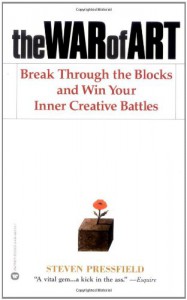
I don't for a minute believe anything Pressfield says about the universe or inspiration. Like so many "self help" books, Pressfield's advice is founded on a completely unsupportable metaphysic - I find myself utterly disagreeing and rejecting his metaphysics while finding his practical advise utterly useful and inspirational. (I have this experience so many times with these books - can't stand the foundation but understand and appreciate the practical advice.)
I guess Pressfield's ideas about the universe and existence are a necessary noble lie for many people - no doubt Pressfield himself - in order to convince himself and his readers of the value of his advice. Because I honestly don't know why all this bullshit is necessary to get to the very simple message of this book: in order to be a successful artist, you usually need to be professional. And this is something I was sort of aware of, but I need someone like Pressfield to kick my ass and remind me of that. Yes, Pressfield is privileged that he can write 5 hours a day and not have to worry about a job, but he seems to have even done similar activities when he couldn't do that. I want to take his advice wholly to heart but I know I will struggle with it and I can see myself reading this book multiple times over the next few years as I struggle to become more and more of a professional about my writing.
A must read for anyone who procrastinates.
A true classic

I love the slow burn of this. Putting aside its importance - isn't it one of the first major novels by an actual African, if not the first? - I love how this unfolds: you have no idea the real crisis until well into the book. This is just begging for a movie adaptation. But anyway.
I apologize for any SPOILERS.
What begins as a story of a man who perhaps misunderstands his role in the traditional community - as he attempts to compensates for the perceived failings of father - and, as a result, does some things that cause him to be formally exiled from that community, turns into a powerful, devastating story of the fully uncomprehended (by us) effects of colonialism on small communities in what is now Nigeria, and one man in particular. I found the early going rather trying - I felt I understood the conflicts of Okonkwo well and I felt a little like it wasn't going anywhere. Sure, Okonkwo does some things that he wouldn't have done if he weren't trying to overcompensate for his father but, on the whole, I found this struggle not exceptionally well told compared to other contemporary literature. It is once the white man shows up where the real power of the novel shows through, and as it "rushes" to its conclusion, we are possessed with dread about Okonkow's destiny, and what I feared was so much less bad, so much more noble, than his true end. That ending is one of the more devastating final chapters I have encountered in a novel.
Fantastic.
Not your usual biography
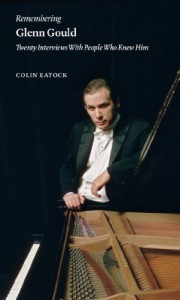
This is a very unusual biography in that it is told by the people who knew Gould instead of by an author who tries to create a narrative of his life. The approach is interesting and, if you don't like false narratives, it's refreshing. And certainly there is a lot of information for Gould obsessives or anyone (like me) who has only ever watched documentaries about him and not read anything.
But Eaton asks very similar questions to each person. He fails to follow up a lot of the time when someone says something weird or interesting. Occasionally he does, but usually he just sticks to the script. Also, despite what the back alleges, Eaton doesn't attempt to connect all the interviews into a portrait more than very briefly at the beginning. I guess that was what he was setting out to do, but it still feels odd that there's no conclusion or epilogue or what have you.
This is absolutely worth reading if you have an interest in Gould. And it's absolutely worth reading if you are interested in alternative forms of biography, but the approach still leaves a lot to be desired and it will leave you wanting to read something more comprehensive.
Ugh
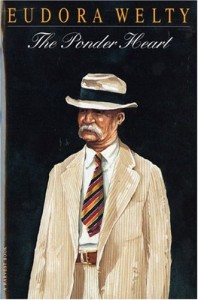
I'd like to believe that all my favourite funny things - Python, KITH, Mr. Show, and numerous others - transcend time and place, and are objectively funny. I know that's not true, as tons of people don't like Python, for example. But I'd like to believe. And I'd like to believe it about all great humourous art, not just serious art. But I honestly don't know if it's true or not. And when I read something like this, I lean more toward the side that humour isn't transcendent; rather it is contextual and without context you may not be able to appreciate it.
And I believe that about The Ponder Heart because I find it spectacularly unfunny. I understand that it is supposed to be humourous, and I understand what type of humour it is, and I understand that there is a certain craft behind it, but I think I chuckled once, maybe twice.
Now I know this is a style of humour that I don't normally like, but I'd like to think that I can at least appreciate the craft. But I can't help but just find the whole thing frustrating and infuriating. I'd like to think that if there was more to this than just a goofy little story about a lovable old rich gentleman, I'd have something to appreciate. But I just don't see it.
Worth your time
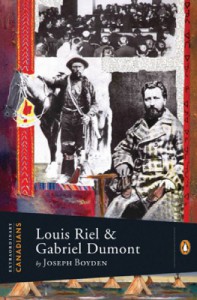
At first, I found the style fairly jarring. This was not what I was expecting. And I am not sure it's entirely appropriate, certainly if you are looking for a rigourous historical study. But, as I read it, I found it worked well enough. Well enough that it triggered my own creative ambitions, much like the other book I read in this series.
Where you read it here or somewhere else, the story of the Metis in the "North West" is tragic. This version, which emphasizes the plans of Dumont and Riel, is particularly tragic, as you are exposed to the possibility that Dumont could have easily delayed and thwarted the Canadians (at least for one season), and who knows how that would have changed how Canada treated the Metis and the other native Canadians. Instead, he listened to Riel, and that dynamic is very compelling as much as it's tragic.
An engaging telling of the story.
Very important read if you are going through this or have "uncoupled'
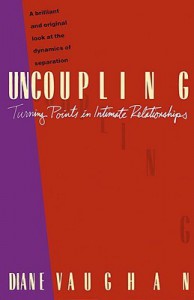
I interrupted by normal reading schedule to read this book specifically because I was going through a breakup - a relationship of nearly five years, the longest romantic relationship of my life, had ended. I chose Uncoupling of the books recommended to me because I found it the easiest but also because it appeared to not be a a self-help book, and I don't enjoy the proscriptions of self-help books - I generally find them condescending.
On the whole, Uncoupling is a landmark study of the end of relationships and if you, like me, learn and grow from seeing yourself in the experiences of others, it should benefit you as well as it benefited me. Out of necessity, Vaughan creates two types in the relationship, the initiator and the partner. I found this typology helpful because I saw in my past behaviour both the initiator - albeit an initiator who had not yet acted - and the partner; that is I transitioned from one role to the other, as she notes many do. And I believe my former partner did the same, only the opposite direction - partner to initiator.
But far more helpful were the quotes of the interviewees - honest, raw, bare, naked, or whatever you want to call them, these people shared their deepest feelings about their dying or dead relationships and reading these made me feel so much less alone, so much less of a failure. And I must say that without this book I believe the end of my relationship would have probably been rockier (at least for me). I am a strong believer that "moving on" requires knowledge and understanding and Uncoupling has given me that.
But the book does have a few flaws that I want to acknowledge: First, it is definitely dated. I would highly recommend seeking out an updated version if one exists or, if one doesn't exist, I would hope that she has one planned.
Second, though Vaughan admirably deals with problems with selection bias (and other biases) in the postscript, I did indeed detect a bias, albeit not one she focused on. That bias was an academic one - in trying to be inclusive as a typical sociologist, I found Vaughan's interviews to be a little overly inclusive so as to not accurately reflect the population (at least in the way they presented them). I'm not sure this is really a criticism, it just seemed odd to me.
But overall I would highly recommend this book to anyone who has been through a breakup and has not moved on or is currently going through a breakup. And, if you can read it discreetly, I would highly recommend this to anyone who is unhappy in a marriage or relationship and wants to save it. And I say this simply because had I known I was doing the things I was doing to show I was unhappy, maybe I would have talked to my ex about them, or maybe I would have tried to deal with the symptoms at the very least - or at least maybe I would have recognized my own unhappiness and done something differently.
Really interesting
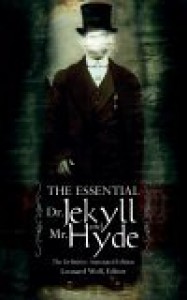
This is an immense edition of what is otherwise a pretty short novella. It is nice that a story like this would get this kind of treatment, but it's kind of over the top. For example, the novella itself is rather over-annotated. How is that possible, you ask? Well, even one of the footnotes has its own footnotes. (Yes, that's right, a footnote has multiple footnotes to itself.) And while some of this information is interesting, much of it is inconsequential and repetitive.
The Strange Case of Dr. Jekyll and Mr. Hide is one of the great works of horror or science fiction of the 19th century. I have seen many, many film and TV versions of the story and its amazing how different the source material truly is. (Wolf notes that most if not all film versions are based on a play adapted from Stevenson's story, not Stevenson's story.) This is obviously a classic mystery but it's a lot deeper than one would expect. It can be read many different ways - including as an allegory about homosexuality, though that's probably not accurate - and, despite the rudimentary psychology of his day, Stevenson does a good job getting at some major issues of the human condition. The one problem is that the notes point out what Wolf calls "plotting errors" and I therefore was made aware of some mistakes I might not have caught.
9/10
The collection also includes some of Stevenson's other stories.
"Thrawn Janet" is a neat horror story that feels almost like an early version of The Exorcist. It's pretty scary and it's doubly interesting because it is mostly told in Scottish dialect, giving it a really strong sense of place and marking Stevenson as a predecessor to a many greater novelists.
9/10
"The Body Snatcher" has a lot of good qualities, particularly its opening and then how it turns to a very different story. However, I feel like the opening and the ending don't quite fit.
8/10
"Markheim" is almost a kind of Faust in reverse. It's fascinating stuff, but I am never as gripped by these types of imaginings as by more conventional horror stories.
8/10
"The Merry Men" is a significantly longer story than the above and, though it is significantly less "scary" than the other stories included, it is significantly more atmospheric. I think it is one of his strongest works.
9/10
"Le Chavalier Double"
This last story is not by Stevenson, but is rather one of the inspirations. At least in Wolf's translation it's not very compelling - more like a condensed old myth that's not told very well. It's pretty obvious and just kind of not very well done.
5/10
Please note that the print job, at least on our copy, is terrible.
Meh

This is a brief, cursory biography as these things go. It's certainly interesting but the predominant feeling I am left with after finishing is "I want to know more." Gleeson says she didn't want to get bogged down in financial details to make this accessible to the general reader but the problem is that her thesis is significantly hurt by her unwillingness (or inability) to discuss the financial moves of Law in greater detail. This is much more a portrait of a person than it is a discussion of the legacy of his behaviour. I would have liked more detail, more context and definitely more analysis. I guess that's what you get when you read a biography of a finance minister by an art critic.

It just so happens that I started to watch Ken Burns' Dustbowl just as I finished this book, and contrasting the two approaches is illustrative. It's interesting that Steinbeck makes no mention of the man-made nature of the disaster, even he knew it was man-made. I suspect this is to help further create sympathy for the Joads, but I feel like this was a missed opportunity. But that's not really important anyway. The novel is what it is. I shouldn't worry about whether or not he told a story he wasn't trying to tell.
This is an important, landmark, influential, political novel that deserves it's place in the canon. It's ending is about as ambiguously bleak as I could imagine and my enjoyment (so to speak) of the entire book was significantly heightened by one of the Great Endings in American literature.
But there are two things about it that keep me from giving it full marks: the first is Steinbeck's fault but the second isn't - I understand I am not being fair about the latter.
First, the book is "choppy" for lack of a better word. (The Missus, who has never read this book, and I were talking about Steinbeck and I was trying to express my frustration with the format of this novel and she described Of Mice and Men as "choppy" and suddenly I knew what my problem was.) Though there are moments of power and insight in Steinbeck's descriptions of the mass migration of Americans and their problems, there are far more moments when it feels like Steinbeck is lecturing us about something. I feel that, at bottom, The Grapes of Wrath is really two separate pieces and I feel like Dos Passos' annoying habits are all over that. I think the novel remains stirring and powerful, and remains a landmark, but to me this novel would be greater without all the overview chapters. I think the Joad's story is strong enough without the attempts at context.
The other issue I have is a little different: I have only ever read one other Steinbeck novel, Winter of Our Discontent. And though I think this one is the superior effort in terms of its emotional impact, importance in the canon and so forth, I prefer the writer of Winter of Our Discontent. (I am speaking specifically of his prose, not the subject matter.) Frankly, I think Steinbeck became a better writer as he got older. I kind of wish the mature style of that novel had been the style of this one. I think I would be out and out willing to call The Grapes of Wrath one of the masterpieces of 20th century American literature had Steinbeck been a little better at his craft.
Still, I can't believe it took me so long to read this book.






 1
1
 2
2